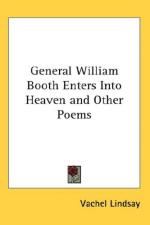|
This section contains 2,932 words (approx. 10 pages at 300 words per page) |

|
SOURCE: "Vachel Lindsay's American Dream," in Columbia Library Columns, Vol. XXXVII, No. 3, May, 1988, pp. 13-24.
In the following essay, Wertheim discusses the social and historical context of Lindsay's major poems.
When Vachel Lindsay ended his life by drinking a bottle of Lysol on the evening of December 4, 1931, in the same house in which he had been born, he was bankrupt, depressed, and ill. His literary reputation had entered an eclipse from which it would never fully emerge, and the lifelong vision of seeing his native city of Springfield, Illinois transformed into an American utopia was no nearer to realization than when he first began to preach the "Gospel of Beauty." Even at the height of his transitory fame, only a handful of poems—those set pieces which still survive in anthologies: "The Eagle That Is Forgotten," "General William Booth Enters into Heaven," "The Congo," "Abraham Lincoln Walks at...
|
This section contains 2,932 words (approx. 10 pages at 300 words per page) |

|


